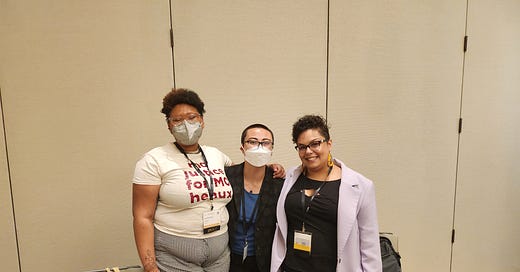Gently Disrupting Philanthropy as Radial Praxis
The Philanthropy Surveys Are Out! The cost of being seen by funders is too high
Something we don’t talk about a lot in philanthropy are the rules of engagement between donors and communities looking for funding:
1) Pay to Play
2) Pay more to Play more
3) Pay Most to Play Best
I’ve just come from another string of donor network (philanthropy) conferences that have me reeling —from the price tags, the choices of conference food, and the amount of sitting attendees are required to endure. I have thoughts, to say the least.
How much have I paid to be in hostile conversations with people who deny my existence? $900, $1,100, $1,350, $1,850, $2,500, $3,500, $13,000+ (this does not include travel or lodging).
One of the donor network gatherings I went to did 8/10 thing right: the vibe was right, the right people were there, but the programming required local organizers to show up. But there was no discount or scholarship process for these CBO attendees who added local context to the program. And no compensation either.
Community-based organizations (CBOs) are often existing in perpetual Survival Mode, meaning there is little room for justification for attending conferences or summits whose price tag to entry is in the 4-digits.
CBOs doing direct services work are especially vulnerable to frequent cash flow issues as they wrestle with city bureaucracies who pay them on reimbursement-only bases; not to mention the direct community care (usually via mutual aid) that grassroots organizations lead to keep individual members fed, clothed, and safe — where the government AND Philanthropy have fallen short— keeps them in a state of weighing opportunity cost with survival.
When the feedback survey came out, I decided that it was time to tell the truth to conference organizers, and I have vowed to do the same with every conference survey I receive.
“The session I led included community organizers in St. Louis who had never been to a funders' conference before. I would have loved an opportunity to give them a scholarship to attend the entire conference. Communities doing the work should not have to pay to get in, especially when they are contributing to the program!”
I hope it’s obvious what my goal is here; I call it Gentle Disruption, but really it’s showing up as my authentic self to radicalize institutional philanthropists who have never seen someone like me in their space before. I cannot emphasize enough: This is radical practice! If we can get more people like me to these spaces, we can change the trajectory of Philanthropy, Institutional grantmaking, and general culture shifts.



